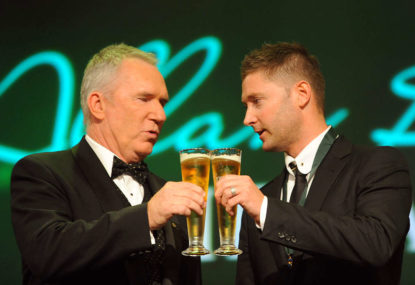With the 2015 Cricket World Cup on our doorstep, it’s worth casting the mind back 28 years and remembering the effect winning the World Cup for the first time had on Australian cricket.
Back in the mid-1980s, Australian cricket was in a crisis. Not the convenient kind of crisis that is loosely applied to trivial matters these days, but a proper, genuine, we-really-are-rubbish crisis.
On the back of the departure of some absolute legends of the game, think Greg Chappell, Dennis Lillee, and Rod Marsh, the Australian team quickly descended to Test Cricket’s whipping boys.
The West Indies arrived on our shores annually – or so it felt – to bounce the stuffing out of us, England had a stranglehold on the Ashes, and even New Zealand were taking trophies away from our cabinet.
In the middle of it all, Kim Hughes resigned as Australian captain in tears, and Allan Border was thrust into the position of leading his country whether he wanted to or not.
“I’d just like to point out that I’ve been a little disappointed at the circumstances surrounding my appointment,” Border said at the time, in that brutal honesty he possessed and that no Australian captain has quite pulled off since.
Things got worse before they improved, too. Hughes led two rebel tours of South Africa in 1985/86 and 1986/87, which saw dozens of Test-quality cricketers ruled ineligible for selection, including Terry Alderman, John Dyson, Rodney Hogg, Trevor Hohns, Carl Rackemann, Steve Rixon, and Graham Yallop.
In their place saw some major selection risks, where relatively untried players, some kids, were thrown into the deep end in the hope they might unearth a few gems among them. No one expected too much.
And did they find a few gems! David Boon, Dean Jones, Geoff Marsh, Craig McDermott, and Stephen Waugh, among many others.
Some major strategic selection decisions also happened around the same time, and while nowadays we’re completely used to different personnel playing in Australian colours across the different formats, thirty years ago it was nearly unheard of.
Without doubt, the biggest turning point in the uplift of the Australian side came with the appointment of Bob Simpson as the Australian cricket team’s first full time coach.
While Simpson became a vital right-hand man for Border around the general running of the national team, both in terms of management and the mental side of the game, the presence of a coach allowed the younger players to develop their game at a much more rapid rate than just playing would have allowed.
Simpson was regarded as one of the best fieldsmen in the game in his playing days, and this was one area of focus for him. His focus and concentration on that discipline very quickly saw the Australians become the best fielding team in the world. It’s a standard they’ve strived to maintain ever since.
Come the 1987 World Cup, Australia were still considered outsiders, and not really expected to get past the pool stage of the tournament. The ’87 World Cup featured two pools of four teams playing six games each, feeding straight into semi-finals.
Australia was in Pool A, along with co-hosts India, and New Zealand, who had taken their one and only trans-Tasman Test Series win on Australian soil less than two years earlier. They had assembled a pretty handy side for the World Cup, a feat they’ve managed to replicate every tournament since then.
But that unfancied Australian team did get through the pool stage. They beat New Zealand twice and Zimbabwe twice, and spilt the two games with India. Both India and Australia progressed with five wins, and Australia built a massive amount of confidence and belief along the way.
The two semi-finals pointed toward the co-hosts, India and Pakistan, meeting in the final at Eden Gardens in Kolkata, but instead they got Australia v England.
Australia got off to a belter in the semi with 300 looking likely, until a late collapse stopped them short. In reply Pakistani wickets fell early and regularly, and the required run-rate pushed eight per over after Javed Miandad was bowled by Bruce Reid. It was too much for the Pakistan lower order.
England then ensured the locals supported Australia in the Final, when after Graham Gooch and Mike Gatting had steered them to their total of 6/254, India fell in a massive heap and lost their last 5/15, to be all out 219.
Eden Gardens was packed for the Final, and Australia got off to another flyer courtesy of Boon, Marsh, and Jones. Then they promptly lost 3/17 in the middle, including McDermott in a pinch hitting role. Mike Veletta joined Border in the 39th over, and they rapidly put on 73 for the fifth wicket as Australia added 85 from the last ten overs to compile 5/253. Veletta finished 45 not out from 31 balls in what CricInfo has labelled “the most forgotten match-turning innings in a World Cup final.”
England looked on track until Gatting tried to reverse-sweep Border. From there, steady wickets and some superb death bowling from the 22 year-old future captain Waugh restricted the score to 8/247.
That World Cup win would prove the catalyst for a two decade reign of success for the Australian team.
Border led the side who took the Ashes away from Lord’s in 1989, Mark Taylor’s side toppled the West Indies in 1995, and then Waugh’s and Ricky Ponting’s teams enjoyed a wave of success that included 16-Test unbeaten streaks and the 1999, 2003, and 2007 World Cups along the way, the ’03 and ’07 triumphs coming undefeated.
And to think what might have been had Allan Border resigned as captain in the early days, something he very nearly did several times. A classic case of a young side that was better and stronger than they, and many good judges thought.
Help is a click away
We’ve all faced setbacks that were tough to overcome. Problem gambling can feel like that. It feels like that to thousands of Australians every day.
But we’re all stronger than we think and help is just a mouse-click away.






























































































